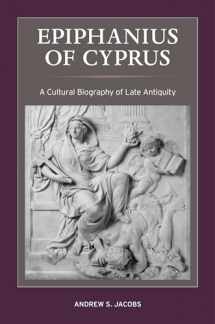
Epiphanius of Cyprus: A Cultural Biography of Late Antiquity (Volume 2) (Christianity in Late Antiquity)
Book details
Summary
Description
Epiphanius, Bishop of Constantia on Cyprus from 367 to 403 C.E., was incredibly influential in the last decades of the fourth century. Whereas his major surviving text (the Panarion, an encyclopedia of heresies) is studied for lost sources, Epiphanius himself is often dismissed as an anti-intellectual eccentric, a marginal figure of late antiquity. In this book, Andrew Jacobs moves Epiphanius from the margin back toward the center and proposes we view major cultural themes of late antiquity in a new light altogether. Through an examination of the key cultural concepts of celebrity, conversion, discipline, scripture, and salvation, Jacobs shifts our understanding of "late antiquity" from a transformational period open to new ideas and peoples toward a Christian Empire that posited a troubling, but ever-present, "otherness" at the center of its cultural production.


We would LOVE it if you could help us and other readers by reviewing the book
Book review



